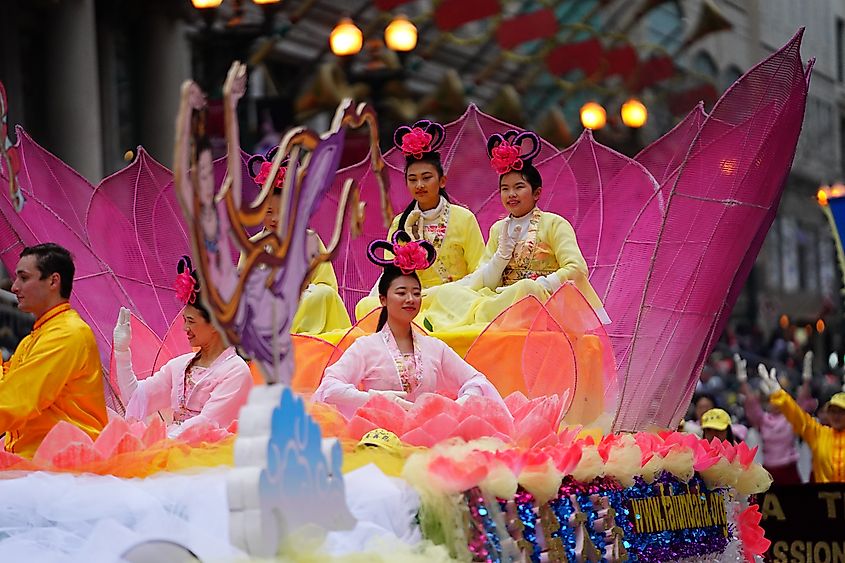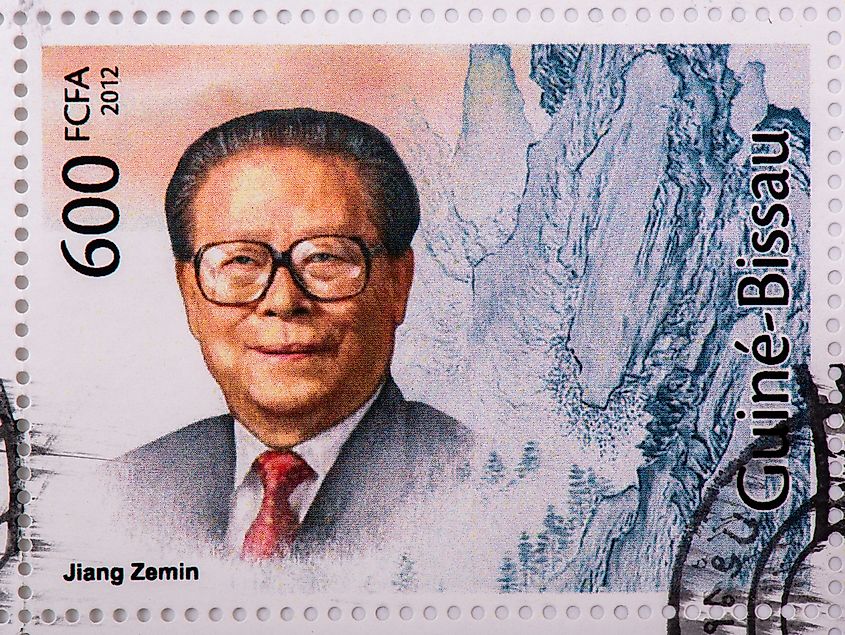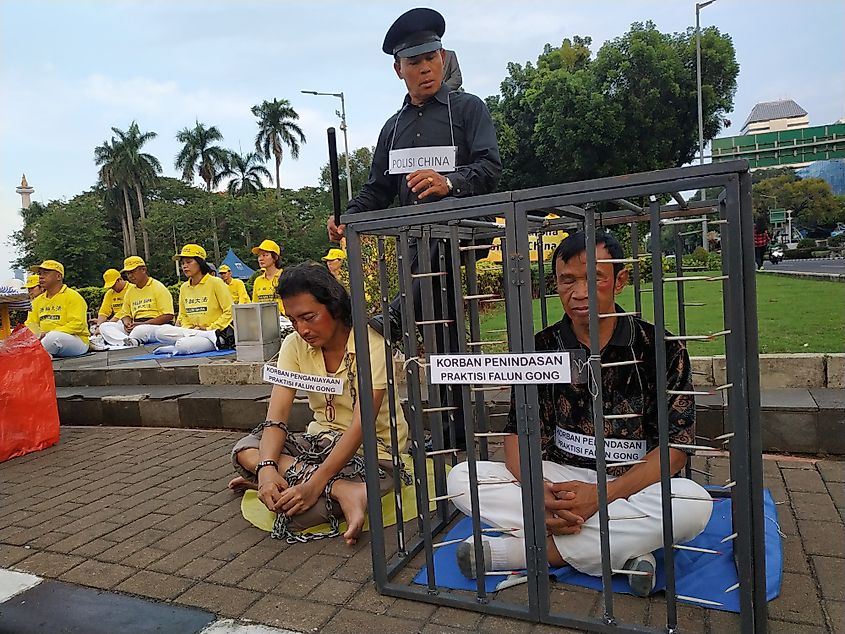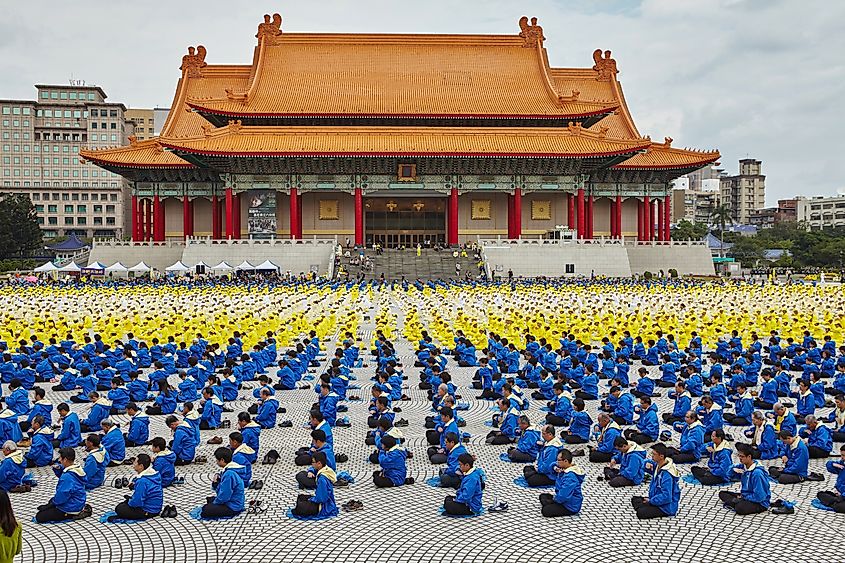
Communist China vs The Falun Gong
When they march in Victoria Park, Hong Kong — or in any city across the globe — they stand out in their bright attire. Once supported or, at best, ignored by Communist China, Falun Gong today finds itself on the receiving end of a suppression campaign by the Chinese government authorities. On July 22, 1999, the Falun Gong was banned by Chinese authorities after staging what many regard as the biggest protest Beijing had seen since the 1989 Tiananmen crackdown.
At a cursory glance, the Falun Gong appears harmless. One, therefore, wonders how such an innocuous group can pose a threat to the government of the People’s Republic of China, a powerful bureaucracy known to exercise a stranglehold on various spheres of life.
What Is the Falun Gong?

Li Hongzhi, a former trumpet player who hails from northeast China's Jilin Province, is credited with founding Falun Gong in 1992. He experienced “Chushan” in May of the same year when he “came out of the mountains” with the new revelation. In Chinese, “Chushan” refers to when a sage starts propagandizing a new idea publicly after a period of relative seclusion.
While opinions travel the whole gamut, experts describe Falun Gong as “a cultivation system,” which, in Chinese tradition, refers to sets of mental and physical regimens “that may involve special techniques of breathing, exercises, and visualizations.” Chinese cultivation systems often involve meditations, diets, and sexual practices that aim to refine and elevate the body and soul into a higher form. On their website, Falun Gong claims that the concept is rooted in Buddhist tradition. While these concepts are not always clear, they have been manifesting differently over the centuries. The current manifestation of Falun Gong is a variant of the more recent “qigong,” which, in turn, draws much from the ancient Buddhist traditions that have been practiced for millennia.
“Qigong” is a combination of the Chinese words “qi” and “gong.” The former refers to substances that are invisible yet present in the human body and cosmos — while the latter refers to a kind of vital energy necessary for health and human prowess. Qigong refers to the cultivation of vital energy to achieve physical and spiritual health. The movement was long suppressed during the reign of Mao Tse-tung, but government policy toward religion shifted after Mao’s death in 1976. Just six years later, in 1982, the Central Committee of the CCP issued what was known as “Document 19.”
The document made some allowances for religion and granted Chinese citizens freedom of religious belief. Qigong, which is religious in tone and texture, would soon become a fad. Li Hongzhi’s version of Qigong—the Falun Gong—subsequently became quite popular and was tolerated by the Chinese political class, who saw in it a possible path to the country’s moral and physical renewal.
In 1993, Li Hongzhi participated in the second Oriental Health Expo in Beijing, where Falun Gong was honored with an “Advancing Marginal Sciences Award,” the highest award of the Expos. But the CCP later changed tune, and what was once an ally became a deadly foe.
The CCP’s About-turn on Falun Gong

The CCP’s about-turn on Falun Gong was as dramatic as it was unusual. While the Falun Gong had benefited from tacit (and sometimes explicit) government support, it now found itself in the crosshairs of the powerful Chinese government machinery. This caught many observers by surprise. But it was bound to happen. For starters, as of 1999, the Falun Gong’s membership was ostensibly in the tune of at least 70 million followers. This surpassed the CCP membership, which stood at 63 million. Put simply, Falun Gong had emerged as the largest faith community in the country after Chinese Buddhism. This may have caused some unease in the ranks of the political class. Remember that in China, allegiance to the state — not a charismatic spiritual figure or seductive idea — is prized highly.
Secondly, there was some ideological friction. The values of tolerance, truthfulness, and compassion, which the Falun Gong taught, were low-key contradictory to the values of materialism and nationalism emblematic of Marxist ideology. It was an alternative moral compass. Plus, Beijing may not have liked the independent nature of Falun Gong since the group had cut links with the state-run Qigong association. Obviously, it would be difficult to control an amorphous group operating as a personal practice without formal membership.
The Chinese Government’s Suppression of the Falun Gong

The Chinese government started to restrict the operations of Falun Gong. Frustrated by the latest turn of events, an estimated 10,000 to 30,000 Falun Gong practitioners staged a protest in Beijing, particularly at the Zhongnanhai, the compound that serves as a residence for the leadership of the Chinese Communist Party (CCP). It was the biggest protest in the capital since the 1989 Tiananmen affair. Unfortunately, it worsened matters for Falun Gong adherents. Low-key harassment turned to full-blown persecution.
The government soon produced circulars forbidding Party members from practicing Falun Gong. On July 21, 1999, Falun Gong was outlawed. The same day, an arrest warrant was issued for Li Hongzhi. Three months later, China’s National People’s Congress promulgated an “anti-cult” law. In the capital Beijing, more than 1,600 practice sites were shut down. Across the country, thousands of Falun Gong practitioners were detained and questioned. Some were promised freedom only after revealing the identity of group organizers, who were then arrested, tried, and sentenced to prison terms of up to 20 years. Since 1999, hundreds, maybe thousands, of Falun Gong practitioners have died in custody from torture, abuse, or neglect.
While the crackdown is nationwide, the severest human rights abuses have been reported in China’s northeastern provinces. There have even been allegations of special concentration camps and organ harvesting. However, a surprise visit by American officials from the U.S. Embassy in Beijing and the U.S. consulate in Shenyang to such a camp in Sujiatun, a district of Shenyang city in Liaoning province, found no evidence of organ harvesting.
The Falun Gong Today

Despite the CCP’s heavy-handed crackdown, it is possible that the number of Falun Gong adherents remains in the millions or tens of millions. Outside China, the numbers are even higher. According to a 2017 estimate by the U.S.-based NGO Freedom House, the number of Falun Gong practitioners outside China is between 20 and 40 million. It seems, after all, that Falun Gong may be down but not out yet.
It is worth noting that while the group was banned in mainland China, its members were allowed to practice freely in Hong Kong. That said, a security law passed by China for Hong Kong in 2020 and drafted almost entirely in secret may significantly limit the practice of the activities of the group. The law criminalizes “acts of secession, subversion of state power, terrorist activities, and collusion with foreign or external forces to endanger national security.” However, Beijing rejects the claim that the laws target Falun Gong practitioners.
At the moment, there is little indication that Falun Gong has become a rallying cry for other disaffected social groups despite the Chinese government allegedly characterizing it as “the most serious threat to stability in 50 years of communist history.”











